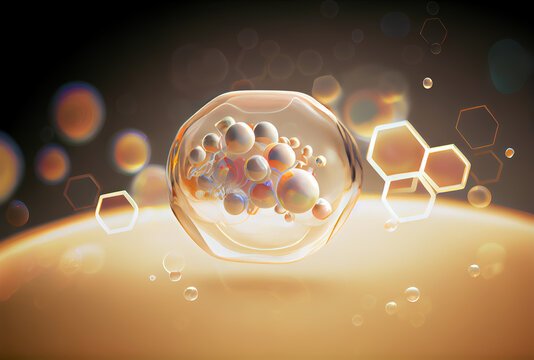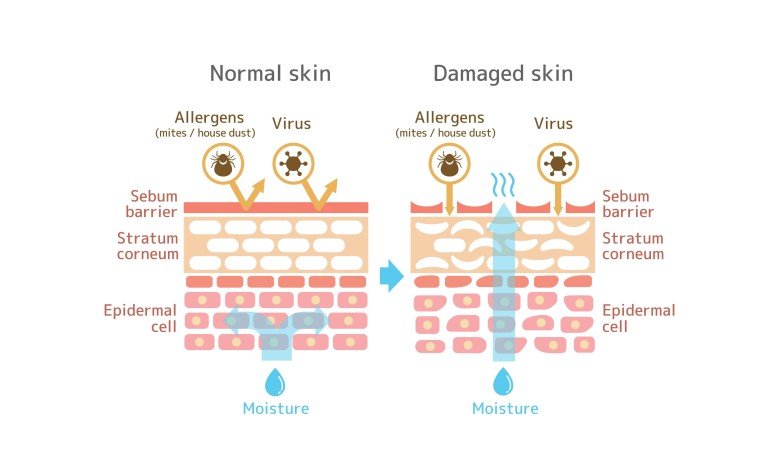Free Shipping above ₹1699

With the plethora of skincare products available in the market and the ongoing rage for acids, retinol and peels, most of us are jumping on the bangwagon without actually knowing what they are and how they are to be used. The result, itchy, irritated, or burning skin. When your skin barrier is not functioning properly, you may be more prone to develop these conditions :
Your skin has three main layers : the epidermis, dermis, and hypodermis, each has several sublayers, most of which perform unique, specialised functions. The skin barrier also referred to as the “moisture barrier” or “acid mantle,” is a term used to describe the outermost layer of the skin (stratum corneum), its job is to keep bad things like irritants out and good things like hydration in.
Dermatologists often liken the stratum corneum’s structure to being like a brick wall. In this analogy, the skin cells are the bricks and the mortar is the lipids and proteins between. Together, these compounds are referred to as the skin’s “natural moisturizing factor” because they help keep the deeper layers of skin hydrated and nourished and is key for not only dewy, bouncy skin, but overall healthy skin. Keeping your barrier strong slows down transepidermal water loss (TEWL), which can lead to skin conditions like atopic dermatitis and eczema. The skin barrier protects the internal body from physical toxins (such as pollution and harmful chemicals) and ultraviolet radiation from sun exposure.
Your skin barrier is essential for your overall health and needs to be protected to help your body function properly. A healthy skin barrier is also key to obtaining hydrated, glowing, even skin.

Skin barrier can easily become damaged. From your genetic makeup to your lifestyle can influence the health of skin barrier. Generally, the significant factors that can impair barrier function include :
Any internal or external stressor that results in visible skin changes is likely capable of disrupting or damaging your skin barrier.
A damaged skin barrier can usually heal itself within two weeks, depending on the damage, provided you avoid chemical and physical exfoliants (acids, retinoids, vitamin C) and switch to a gentle, soothing products.
Even though the skin barrier has its own regenerative capacity, there are also things you can do to help facilitate the recovery process.
As a general rule of thumb, pare down your skincare routine. Focus on healing, hydrating, nourishing, and skin-replenishing ingredients like niacinamide, hyaluronic acid, glycerin, ceramides, cholesterol, etaglucan, sodium PCA, squalane, and centella asiatica. Stick to a bland and hydrating routine for at least -3 weeks before adding exfoliation back in once or twice a week.
Besides repairing your skin barrier, you would want to protect and strengthen the barrier so that it’s less susceptible to future damage. It’s neccessary to understand your skin issues in order to address them one by one and not all simultaneously. Avoid overdoing your skincare routines. Introduce new products, actives one at a time and do go slow on your actives. Unless you have extremely acne-prone skin, using exfoliants 1-3 times a week is more than enough.
Use a Gentle Cleanser
Choose a cleansers with a pH close to your acid mantle’s natural range of 5.0-6.0 to avoid messing with the acidity and to protect those natural ceramides and oils that form the glue to your skin’s barrier. Depending on how many products you have on your skin, you may want to do a “double cleanse”. Those with acnesensitive can use a prescription-strength sulfur cleanser to soothe the skin.
Choose a Serum/Moisturizer Designed for Barrier Repair
Balance your exfoliating actives by incorporating serum/moisturizer that are designed to support the skin barrier like ceramides, fatty acids, and cholesterol. They can help compensate for a deficiency in your skin’s natural lipids and ultimately aid in barrier repair. Ceramide moisturizer may be especially helpful if you have acne. In acne-prone skin, the barrier is often impaired, and acne treatments can leave skin dry and reddened.
An occlusive moisturiser aids the skin barrier by reducing the amount of water loss from your skin
(petrolatum). Likewise, humectants can also improve barrier function. Humectants work by drawing water either from the environment or from inside your body to keep your skin moisturized. Glycerin and hyaluronic acid are the most well-known humectants in moisturizers, and others include alpha hydroxy acids (glycolic, lactic), panthenol, sorbitol, urea, and propylene and butylene glycol.”
Your skin barrier defends your body against environmental threats while simultaneously maintaining the water balance. Keeping it healthy is much more than a cosmetic concern.